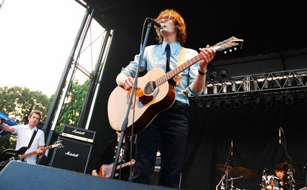Jarvis Cocker: Pitchfork Music Festival
By user • Jul 23rd, 2008 • Category: Concert ReviewsAt a concert run by a media outlet with a reputation for ahead-of-the-curve taste-making, this year’s Pitchfork Music Festival featured more than its share of original hipsters.
Mission of Burma. Public Enemy. Wu Tang Clan members Ghostface and Raekwon. A double dose of Lou Barlow in Dinosaur Jr. and Sebadoh. So it shouldn’t have come as a surprise that arguably the weekend’s best set came from a 44-year-old former heartthrob who’s been making music for 30 years. As ex-Pulp front man Jarvis Cocker’s dusk set approached, the buzz throughout Union Park reached a chatty degree.
“I saw him at Coachella,” one fan bragged.
“I’ve seen him twice,” another chimed in.
The Cocker-ites spoke of the suave singer like he was a mythical creature, remembering when and where they had the pleasure of catching a glimpse of the Brit Pop icon. But this isn’t exactly the same performer who toiled in obscurity for the 1980s and a portion of the ’90s before striking massive critical and commercial gold. Gone are the Sheffield native’s colorful ties and leisure-suit days that became so connected with masterful albums such as His ‘n’ Hers, Different Class, and This is Hardcore. Those days were hung-up with Pulp’s hiatus in 2002. Today, Cocker looks truer to his academic roots in a navy blazer and matching tie. His chiseled cheekbones and protruding jaw are still recognizable, but they are hidden behind almost-shoulder-length brown shag and massive eyeglasses. Somehow, the frail singer looks even thinner, his big-heeled shoes adding a few inches to his lengthy physique.
This isn’t your older sister’s Jarvis Cocker. This is the 2008 model, and the one that took Pitchfork’s stage ahead of only the night’s headliner, Animal Collective. But for all the physical changes that come with cashing in your pin-up days and sarcastically entering middle-age, he hadn’t lost what made him great. His conversations were as smart as ever, his faux Mick Jagger dance moves as sultry as in his heyday, and his voice as deep and effortlessly sexy as on his best records.
Maybe this is your sister’s Jarvis, after all.
Playing nary a Pulp tune, Cocker and his five band mates cherry-picked material from 2006’s Jarvis and his upcoming, as-yet-untitled solo follow-up. The hyper-sexual singer crooned his way through the sister tunes “Big Julie” and “Angela”, as well as the sardonic “Fat Children” and the tongue-in-cheek “Tonite”, while “Black Magic” spiraled along with its “Crimson and Clovers” riff. Throughout the set, the charismatic front man jumped and kicked, perched on the speakers, stomped his feet, used his hands to act out lyrics, and strutted forward and backward in a way that only someone with his dry sense of humor could pull off.
The consummate professional with a deserving reputation for uncanny banter mixed a few non-sequiturs into his set: listing several famous Chicagoans (On dental educator Charles G. Maurice: “What is a dental educator? Do they teach teeth to chew? I’d like to know by the end of the show.”), recounting several of the city’s nicknames (“Why is it called the ‘City of broad shoulders?’”), telling a story from the funeral of legendary radio personality John Peel (the song “Girls Like it Too” gets it title from a letter read at the service from Peel to his younger brother about sex), and Cocker’s history of the blues (It was born in Chicago and was “rather radical,” at which time it was adopted by guys on “big motorbikes” the size of cars, and crossed the Atlantic where Eric Clapton heard it. “Sorry about that,” on behalf of England.). The mesmerizing singer even made Wikipedia seem credible when offsetting the criticism that anyone can update the Web site and write whatever they want. (“Who do you think writes books?”).
He ended the night’s set with the hidden track on Jarvis, “Cunts are Still Running the World”, before returning for a keyboard-driven encore, a cover of Master C & J’s “Face It” – a nod to Chicago’s house music.
With one final quip, he begged voters to make it possible for him to stop playing his semi-political song after November’s presidential election. “People say Barack Obama lacks experience,” he said. “But look where experience got us.”
It might be true in politics, but not in music. And during his Saturday night set, experience made all the difference.
Soundcheck Magazine, July 2008

user is
Email this author | All posts by user

